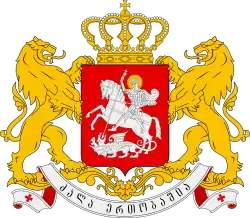 |
|---|
|
|
On February 17, 2004, the Georgian Parliament approved with 165 votes to 5 Zurab Zhvania as Prime Minister and the new cabinet, which consists of 15 Ministers and four State Ministers. Most of the ministers in the new government are in their thirties and are western-educated. Four cabinet members are women. One part of the ministers are the holdovers of the provisional authorities, which took over the power after the bloodless Rose revolution in November 2003. President Mikheil Saakashvili said also that the new cabinet would be “young, professional and the most progressive in the Eastern Europe.”[1]
| Portfolio | Minister[2][3] |
|---|---|
| Prime Minister of Georgia | Zurab Zhvania |
| State Minister in charge of Georgia’s integration into the European structures | Tamar Beruchashvili |
| State Minister in charge of the national accord policy | Guram Absandze |
| State Minister in charge of conflict solutions | Goga Khaindrava |
| State Minister in charge of development of the small and medium business | Jambul Bakuradze |
| Minister of Foreign Affairs | Tedo Japaridze |
| Minister of Finance | Zurab Noghaideli |
| Minister of Internal Affairs | Giorgi Baramidze |
| Minister of Internally Displaced Persons from the Occupied Territories, Accommodation and Refugees | David Darakhvelidze |
| Minister of State Security | Zurab Adeishvili |
| Minister of Defense | Gela Bezhuashvili |
| Minister of Education and Science | Kakha Lomaia |
| Minister of Economy and Sustainable Development | Irakli Rekhviashvili |
| Minister of Agriculture | Davit Shervashidze |
| Minister of Infrastructure | Tamar Sulukhia |
| Minister of Refugees and Accommodation | Eter Astemirova |
| Minister of Justice | Giorgi Papuashvili |
| Minister of Environment Protection and Natural Resources | Tamar Lebanidze |
| Minister of Energy | Nikoloz Gilauri |
| Minister of Health Care | Gigi Tsereteli |
| Minister of Culture and Sport | Goka Gabashvili |
See also
References
- ↑ Georgian Cabinet Approved, Civil Georgia, 17 February 2004.
- ↑ "Government of Georgia. Members". Archived from the original on 2011-07-17. Retrieved 2013-04-12.
- ↑ "CIA: Georgia. Chiefs of State and Cabinet Members of Foreign Governments". Archived from the original on 2013-06-24. Retrieved 2013-04-12.
This article is issued from Wikipedia. The text is licensed under Creative Commons - Attribution - Sharealike. Additional terms may apply for the media files.